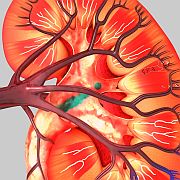South African researchers report ‘impressive’ results in 27 cases
THURSDAY, Feb. 12, 2015 (HealthDay News) — New research from South Africa suggests that HIV may not be a barrier for kidney transplants between people infected with the virus. The study appears in the Feb. 12 issue of the New England Journal of Medicine.
In the study, 27 HIV-positive patients with kidney disease received transplants from HIV-positive donors who had died. All were or had been taking HIV medications. The researchers report that the patients did well overall — an accompanying commentary calls the results “impressive” — with 74 percent still alive after five years. However, their bodies were more likely to reject the donor kidneys, according to study author Elmi Muller, M.B., Ch.B., M.Med., head of transplantation at Groote Schuur Hospital in Capetown.
The research doesn’t appear likely to have an immediate impact in the United States, where HIV infection isn’t as common and kidney disease is often treated with dialysis instead of transplants, experts noted. But in South Africa, “using HIV-positive donors might resolve some of the problems we are all experiencing in getting enough donors for our patients with end-stage kidney disease,” Muller told HealthDay.
While all the kidney donors in this study were dead, the question going forward is: Should HIV patients consider donating kidneys while they’re alive? Julie Ingelfinger, M.D., coauthor of the commentary accompanying the study, doesn’t think so. She is deputy editor of the New England Journal of Medicine and a professor of pediatrics at Harvard Medical School in Boston. “There are clear reasons why, currently, one would not contemplate using an HIV-positive patient as a donor,” she told HealthDay. “For one thing, such persons have higher risk than most people for kidney disease.”
Full Text (subscription or payment may be required)
Editorial (subscription or payment may be required)
Copyright © 2015 HealthDay. All rights reserved.








